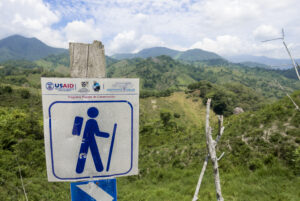Read a compilation of documents from Haitian civil society and Diaspora organizations, conferences and coalitions putting forth their thoughts and recommendations for Haiti’s reconstruction.
Haitian Led Reconstruction & Development
The following documents have been developed by Haitian civil society and diaspora conferences, organizations and coalitions in response to the January 12, 2010 earthquake. The purpose of this compilation is to ensure that Haitian input is accessible to international policymakers, donors, and media as critical strategy and funding decisions are being made that will impact Haiti's future. The views expressed in the documents included are not endorsed by and do not necessarily reflect the positions of the coalition that prepared this document, nor do all contributors endorse each document included. However, each has invaluable insight for recovery, reconstructive and long-term development in Haiti. Within the many upcoming international discussions on Haiti, it is imperative to include the voices of those who are closest to Haiti's challenges.
Below are common strategy points as well as process guidelines that are raised in multiple documents, both for immediate relief efforts and long-term reconstruction and development efforts:
SHORT-TERM RECOVERY
- Provide locally or regionally produced emergency food aid with coordinated and equitable distribution in both urban and rural areas of need.
- Preparation for the imminent planting season by the procurement and purchase of tools and culturally appropriate seeds, as well as by providing agricultural training for displaced persons.
- Support for shelter and temporary housing for internally displaced people, including adequate food, clean water, appropriate shelter for the rain season, medical services and psycho-social support.
- Protection of human rights of especially vulnerable populations, such as women, children, displaced persons and people with disabilities, including security strategies to prevent gender based violence, documentation of human rights abuses, and provision of universal, non-discriminatory access to support and resources.
LONG-TERM RECONSTRUCTION AND DEVELOPMENT
- Support for agricultural infrastructure and development including investments in: seeds and tools; reforestation; water cisterns, new wells, and irrigation systems; soil conservation; and animal husbandry to repopulate the Creole pig.
- Promotion of policies that foster food sovereignty that include land reform, financial support for small farmers, rural investment, and regulation of food markets to protect the local economy.
- Leadership training, capacity building, and support for civil society groups conducted in a way that promotes participation within local, national and international government structures, as well as the ability of Haiti to break its dependency on international aid.
- Strengthening and investment in formal and informal education systems to build national literacy, job creation and universal access in both urban and rural areas.
PROCESS
- Strengthened civil society participation in the design, implementation and monitoring and evaluation of all immediate and long-term reconstruction and development initiatives, both by the Haitian government and international actors. This necessitates sensitivity to language barriers and includes participation in the upcoming March 31 donor's meeting.
- Promotion of transparency and accountability among the Haitian government, NGOs and international donors that is fostered by a robust and active civil society with access to information in locally accessible languages.
- Decentralization of infrastructure and resources in the long-neglected rural areas, including health, agriculture, education, water, sanitation, communications, power, housing, justice and social services.
- Coordination with local, regional, international actors at all levels for reconstruction efforts, which includes aid distribution and repair of infrastructure.
The included recommendation documents from Haitian civil society and diaspora conferences, organizations, and coalitions are listed below:
1. After the Catastrophe: Our Country Can Rise Again, Compiled the coordinating committee of progressive Haitian organizations with SAKS (Sosyete Animasyon ak Kominikasyon Sosyal) saks@saks-haiti.org, ICKL (Institut Culturel Karl Léveque) ickl@ickl-haiti.org, PAPDA (Plateforme haïtienne de Plaidoyer pour un Développement Alternatif) info@papda.org
2. Haiti Response Coalition National Conference Press Briefing, Issued by the Haiti Response Coalition http://www.haitiresponsecoalition.org/
3. Haitian NGOs Decry Total Exclusion from Donors' Conferences on Haitian Reconstruction, Compiled by Jesuit Refugee and Migration Service jrsusa@jesuit.org
4. Helping Haitians Help Themselves: Strategic Plan to Defend Life & Rebuild Rural Agricultural Economy, byFONDAMA (Fondasyon Men Lan Men Ayiti/ Hand in Hand Haiti Foundation)
5. Letter from Camille Chalmers, Sent from the Platform to Advocate Alternative Development (PAPDA) info@papda.org
6. Letter from Jean Valéry Vital-Herne, Sent from The Micah Challenge info@micahchallenge.us
7. Rebuilding Haiti, Prepared by TransAfrica Forum info@transafricaforum.org and KONPAY (Konbit Pou Ayiti)
8. Tet Ansanm Pou Yon Nouvel Ayiti: Reflections on the reconstruction of Haiti from a meeting of representatives of national NGOs and displaced persons from the camps Port-au-Prince, Compiled by Oxfam International info@oxfamamerica.org
9. United Nations Commission on the Status of Women Fifty-fourth Session Oral Statement on the Topic of: Ensuring Haitian Women's Participation and Leadership Are Institutionalized in All Stages of National Relief and Reconstruction, Submitted by the Huairou Commission info@huairou.org
10. A Vision and Principles for Rebuilding Rural Haiti, by Cantave Jean-Baptiste, Partenariat pour le Développement Local and Steve Brescia, Groundswell International www.groundswellinternational.org
This was compiled by the Washington, D.C. based ad-hoc Haiti advocacy coalition, which includes:
ActionAid USA
American Jewish World Service
Center for Human Rights and Global Justice
Church World Service
Environmental Justice Initiative for Haiti
Foreign Policy In Focus
Grassroots International
Groundswell International
Institute for Justice & Democracy in Haiti
Jesuit Refugee Service/USA
Lambi Fund of Haiti
Latin America Working Group
Lutheran World Relief
Mennonite Central Committee U.S. Washington Office
Outreach International
Oxfam America
Robert F. Kennedy Center for Justice & Human Rights
TransAfrica Forum
Unitarian Universalist Service Committee
United Methodist Church, General Board of Church and Society
Washington Office on Latin America

